| Reviews & Columns |
|
Reviews DVD TV on DVD Blu-ray 4K UHD International DVDs In Theaters Reviews by Studio Video Games Features Collector Series DVDs Easter Egg Database Interviews DVD Talk Radio Feature Articles Columns Anime Talk DVD Savant Horror DVDs The M.O.D. Squad Art House HD Talk Silent DVD
|
DVD Talk Forum |
|
|
| Resources |
|
DVD Price Search Customer Service #'s RCE Info Links |
|
Columns
|
|
|
Jurassic Park 25th Anniversary Collection
Universal // PG-13 // May 22, 2018 // Region 0
List Price: $79.98 [Buy now and save at Amazon]
The Films:
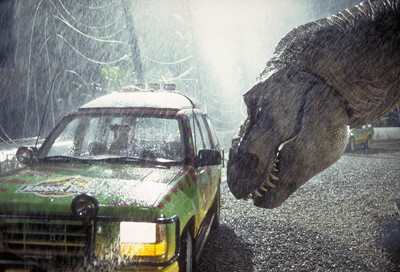 Dinosaurs have generated widespread, some might say mainstream fascination for at least a century now, and it's easy to understand the reasons behind this. With modern perceptions that hefty crocodiles and long constricting snakes are the largest, most dangerous reptiles occupying the earth -- and fantasy stories recall dragons soaring through the sky -- it's no wonder that tales of real-life monsters stomping across continents strike a chord with children and adults alike. The popularity started to really take off in the ‘70s and ‘80s, though, with kids choosing their favorite dinosaur types, rocking t-shirts with them on the front and watching any number of dino-themed shows, cartoons, and specials out there. Me? I was a Triceratops kid who binged "Dinosaurs, Dinosaurs, Dinosaurs" until the VHS tape fell apart and endlessly played with Dino-Riders toys. Therefore, when Steven Spielberg's Jurassic Park first showed up in theaters for the slightly-older version of myself to see, I was left in awe. Those were real dinosaurs ...!
Dinosaurs have generated widespread, some might say mainstream fascination for at least a century now, and it's easy to understand the reasons behind this. With modern perceptions that hefty crocodiles and long constricting snakes are the largest, most dangerous reptiles occupying the earth -- and fantasy stories recall dragons soaring through the sky -- it's no wonder that tales of real-life monsters stomping across continents strike a chord with children and adults alike. The popularity started to really take off in the ‘70s and ‘80s, though, with kids choosing their favorite dinosaur types, rocking t-shirts with them on the front and watching any number of dino-themed shows, cartoons, and specials out there. Me? I was a Triceratops kid who binged "Dinosaurs, Dinosaurs, Dinosaurs" until the VHS tape fell apart and endlessly played with Dino-Riders toys. Therefore, when Steven Spielberg's Jurassic Park first showed up in theaters for the slightly-older version of myself to see, I was left in awe. Those were real dinosaurs ...!
Since then, visual effects have advanced beyond measure and Hollywood blockbusters have grown even bigger and more intense, but something else has gradually happened: amid other toy franchises, superhero fandom, and other modern distractions, the mystique of dinosaurs has also faded with time. That's on a broad scale, though: nostalgic adults still get wrapped up in the grandeur of the beasts from the prehistoric era, while those modern kids whom dinosaurs speak to -- perhaps future paleontologists; the next Jack Horner or Mary Anning? -- are still quite enthusiastic about it, maybe even more so than past generations. Even with a little bit of fading mainstream interest, that's why Jurassic Park ceases to become extinct, getting revived by Jurassic World a few years back after being on hiatus for about a decade and a half. Even though none of the films that followed have been able to match the awe generated by the original, each one attempts something innovative while trying to find a way to keep the franchise alive, to … uh, mixed successes and failures. But boy, does the original still hold up.
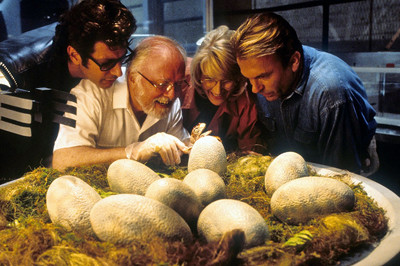 Two-and-a-half decades have gone by since Jurassic Park trampled onto the scene, yet it's remarkable how much still works within Steven Spielberg's modified adaptation of Michael Crichton's book. As Sam Neill's Alan Grant and a cluster of other scientists -- Laura Dern as a paleobotanist; Jeff Goldblum as a self-described "chaotician" -- evaluate what's essentially a prehistoric zoo featuring genetically resurrected dinosaurs roaming the grounds, we're confronted by dated technology, both the tools being used by the scientists and the digital creatures rendered by Industrial Light and Magic. While the execution of the story's extrapolations on DNA engineering and computer systems are handled with informed, future-aware simplicity, Spielberg and his team conscientiously blend practical and digital effects that respect the enormity of what's occupying the island of Isla Nublar. Following the scientists as they gain a grasp on what they're witnessing, the story then organically branches into the themes involved with their wonder, about tampering with natural order and how that plays into consumerism.
Two-and-a-half decades have gone by since Jurassic Park trampled onto the scene, yet it's remarkable how much still works within Steven Spielberg's modified adaptation of Michael Crichton's book. As Sam Neill's Alan Grant and a cluster of other scientists -- Laura Dern as a paleobotanist; Jeff Goldblum as a self-described "chaotician" -- evaluate what's essentially a prehistoric zoo featuring genetically resurrected dinosaurs roaming the grounds, we're confronted by dated technology, both the tools being used by the scientists and the digital creatures rendered by Industrial Light and Magic. While the execution of the story's extrapolations on DNA engineering and computer systems are handled with informed, future-aware simplicity, Spielberg and his team conscientiously blend practical and digital effects that respect the enormity of what's occupying the island of Isla Nublar. Following the scientists as they gain a grasp on what they're witnessing, the story then organically branches into the themes involved with their wonder, about tampering with natural order and how that plays into consumerism.
Of course, what works best in Jurassic Park is the suspense generated by dinosaurs unleashed, elevated by well-crafted adult and child characters coping with the dangers when those barriers separating humans from prehistoric "monsters" malfunction. Researched, yet exaggerated application of info about the prehistoric animals feed into the tension, while differences in age, knowledge level, and degrees of self-preservation create potential human victims worth rooting for (and against). Spielberg pushes the envelope with the PG-13 rating -- there's some blood-‘n-guts and violent death here -- and executes a quasi-horror film in the second half that's genuinely informed by the philosophical ideas explored at the start, with scientist Alan Grant proving to be a marvelous unlikely hero as he uses his pro book-smarts to protect others. Complimented by natural one-liner humor that eases tension, kid characters that aren't obnoxious, and a perspective on dinosaurs that never loses curiosity and amazement, Jurassic Park's concept is brought to life with the pinnacles of what Spielberg has to offer. Jurassic Park:
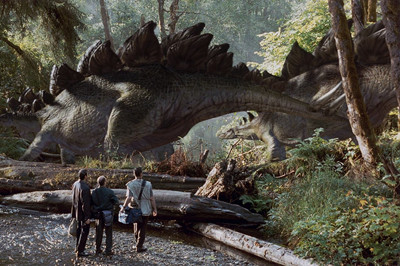 Unfortunately, Steven Spielberg has the distinction of being responsible for both the best entry in the franchise and the worst, following up the enormous success of the original with The Lost World, another semi-adaptation of a bestselling Michael Crichton book. This time, however, Spielberg and writer David Koepp venture much further away from the source material in pursuit of the double agendas that often accompany sequels, sticking to the bare skeleton of the story involving Jeff Goldblum's chaotician Ian Malcolm as this one's brains-over-brawn protagonist. Along with a team commissioned by John Hammond, he returns to the area where the events of the first film wreaked havoc … only onto a second island, Isla Sorna, where even more dinosaurs were created and left to do their thing. Obligatory cameos featuring the original cast, clumsy exposition introducing Ian Malcolm's current girlfriend (Julianne Moore) and neglected daughter, and forced scenarios designed to get the charismatic scientist -- and those he loves -- around dinosaurs again reek of the moving parts of a cash-in blockbuster.
Unfortunately, Steven Spielberg has the distinction of being responsible for both the best entry in the franchise and the worst, following up the enormous success of the original with The Lost World, another semi-adaptation of a bestselling Michael Crichton book. This time, however, Spielberg and writer David Koepp venture much further away from the source material in pursuit of the double agendas that often accompany sequels, sticking to the bare skeleton of the story involving Jeff Goldblum's chaotician Ian Malcolm as this one's brains-over-brawn protagonist. Along with a team commissioned by John Hammond, he returns to the area where the events of the first film wreaked havoc … only onto a second island, Isla Sorna, where even more dinosaurs were created and left to do their thing. Obligatory cameos featuring the original cast, clumsy exposition introducing Ian Malcolm's current girlfriend (Julianne Moore) and neglected daughter, and forced scenarios designed to get the charismatic scientist -- and those he loves -- around dinosaurs again reek of the moving parts of a cash-in blockbuster.
Once on Isla Sorna, The Lost World simply attempts to go bigger and bolder than what was present in the original film, both in the scale of the visual effects and the themes involved with why everyone's there and risking their lives. Spielberg trades respect for the corporeal grandness of dinosaurs for more inventive usage of their physicality, and the embellished digital wizardly accompanying that decision detracts from the attention once given to the prehistoric animals' material realism. While this goes on, the heavily-modified script employs ham-fisted ideologies about those that study nature versus those that yearn to hunt and control it, with the director's normal attentiveness toward characterization giving way to stereotypes, mustache-twirling villains, and hokey use of backstories to move the plot along. Upon the arrival of yet another Goldblum one-liner after a pint-sized gymnast defeats a prehistoric predator, The Lost World loses its remaining clutch on integrity … and that's before Spielberg unabashedly lets a T-Rex loose on the populated mainland, resulting in a dopey cinematic mess of epic proportions. The Lost World: Jurassic Park:
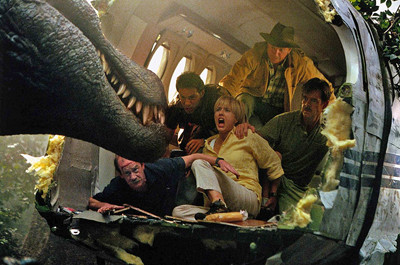 The lackluster reception to The Lost World didn't hit the brakes on the dino-franchise's momentum, but it did keep Spielberg -- and, for the most part, Crichton -- at arm's length from the third installment, Jurassic Park III. Not based on a prior novel, but featuring secondary scenes plucked from Crichton's books, this one revisits Alan Grant as the protagonist, who gets similarly hornswoggled into returning to the dangerous dinosaur-overrun islands some few-hundred miles south of Costa Rica. This time, however, the pursuits are independent of John Hammond and his bioengineering outfit InGen, in which the prospect of further funding his research draws Grant into a haphazard rescue mission for a young boy lost there. Another first, this installment directed by The Rocketeer's Joe Johnson becomes the first -- and, so far, the only -- one that clocks in at less than two hours; without the credits, it's less than an hour and a half. It's obvious what was chopped away to get it that short, as this one avoids intellectual undertones and replaces much of that with "humorous" banter featuring William H. Macy and Tea Leoni as awkward, concerned parents.
The lackluster reception to The Lost World didn't hit the brakes on the dino-franchise's momentum, but it did keep Spielberg -- and, for the most part, Crichton -- at arm's length from the third installment, Jurassic Park III. Not based on a prior novel, but featuring secondary scenes plucked from Crichton's books, this one revisits Alan Grant as the protagonist, who gets similarly hornswoggled into returning to the dangerous dinosaur-overrun islands some few-hundred miles south of Costa Rica. This time, however, the pursuits are independent of John Hammond and his bioengineering outfit InGen, in which the prospect of further funding his research draws Grant into a haphazard rescue mission for a young boy lost there. Another first, this installment directed by The Rocketeer's Joe Johnson becomes the first -- and, so far, the only -- one that clocks in at less than two hours; without the credits, it's less than an hour and a half. It's obvious what was chopped away to get it that short, as this one avoids intellectual undertones and replaces much of that with "humorous" banter featuring William H. Macy and Tea Leoni as awkward, concerned parents.
With Joe Johnson guiding the story into the territory of "let's not take this setting so damn seriously", Jurassic Park III becomes content with being this straight-up, dinosaur-fueled horror show, with a new type of genus to the series -- the Spinosaurus, a hearty competitor to the T-Rex in size and viciousness -- serving as its bloodthirsty killer. This isn't a smart movie, especially when it comes to depicting the advanced communication abilities of velociraptors, but it's hard to deny the effectiveness of the tension generated by the overgrown island and the ways in which the characters must evade prehistoric predators throughout it. Whether it's okay for a Jurassic Park movie to be solely interested in those base cinematic purposes is another matter; the shorter runtime, simpler objectives, and willingness to fudge science for dramatic effect certainly gives it a different attitude. But, when one lumps Jurassic Park III together with loose dinosaur escapades like The Land That Time Forgot or chaotic family-fueled adventures like Johnson's Jumanji, Dr. Grant and that theme song make it … well, not too bad. Jurassic Park III:
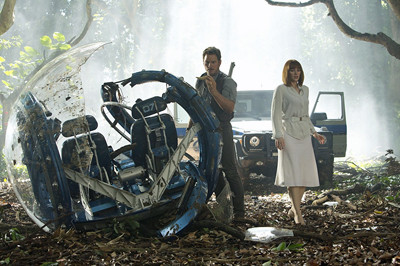 Raking in half the box-office of the previous one, Jurassic Park III didn't instill much confidence in a fourth installment in the franchise, despite Spielberg and others bouncing creative ideas about where it could go. Scripts, producers, and directors churned in a way that put Jurassic Park on ice for well over a decade … until the ideas finally came together for Jurassic World. The premise itself creates a hurdle for those who've followed the story, though: taking place two decades after Jurassic Park, it transpires in a universe where the harrowing events at Isla Nublar weren't enough of a deterrent to keep entrepreneurs and bioengineers from making a modified version of John Hammond's park. All that death and destruction from malfunctioning equipment and intelligent dinosaurs? Nah, that could never happen again, not with modern technology and improved security measures. Thus, Jurassic World™ was formed, a zoo-like epicenter of consumerism where kids ride baby triceratops, people sit at a Sea World-like tank to watch a Mesosaurus jump up and eat a dangling great white shark, and adventurous tourists ride alongside other dinos in motorized hamster balls.
Raking in half the box-office of the previous one, Jurassic Park III didn't instill much confidence in a fourth installment in the franchise, despite Spielberg and others bouncing creative ideas about where it could go. Scripts, producers, and directors churned in a way that put Jurassic Park on ice for well over a decade … until the ideas finally came together for Jurassic World. The premise itself creates a hurdle for those who've followed the story, though: taking place two decades after Jurassic Park, it transpires in a universe where the harrowing events at Isla Nublar weren't enough of a deterrent to keep entrepreneurs and bioengineers from making a modified version of John Hammond's park. All that death and destruction from malfunctioning equipment and intelligent dinosaurs? Nah, that could never happen again, not with modern technology and improved security measures. Thus, Jurassic World™ was formed, a zoo-like epicenter of consumerism where kids ride baby triceratops, people sit at a Sea World-like tank to watch a Mesosaurus jump up and eat a dangling great white shark, and adventurous tourists ride alongside other dinos in motorized hamster balls.
If you're able to come to grips with that -- or mentally work things out so that it's a slightly alternate universe -- director Colin Trevorrow has a shiny, wild environment of dinosaurs both old and new to show those willing to explore Jurassic World. Buttoned-up executive Claire (Bryce Dallas-Howard) oversees operations from a control room filled with computer whizzes, who notices trouble brewing at the paddock where a brand-new dinosaur resides. When I say "brand-new" dinosaur, I mean it: to accommodate for waning interest in regular-ole dinosaurs (a little bit of a meta wink there), the bioengineers have cooked up a bigger, scarier modified breed to attract new visitors … and investors. This officially takes the Jurassic Park universe in a warped, vastly more sci-fi oriented direction than the relative practicality of the original films, and it's up to rugged velociraptor wrangler Owen (Chris Pratt) to sniff out potential problems with the new beast's storage area before it's opened to the public. This will be a shocker, I'm sure, but something goes wrong with its paddock, exposing Jurassic World to its wrath.
Yes, Jurassic World improves upon the previous two entries in this franchise, once again getting back to the wide-eyed wonder of the first film and, by extension, introducing a new generation of movie-goers to the potential that it holds, all while setting up an atmosphere ripe for a monster to tear apart. There's some numb-skulled decisions being made on the park's grounds, though, which take it down a few notches, and they never really stop staring down the audience throughout. Trusting in loosely-trained velociraptors, forgetting about a tracker embedded in a dinosaur before going into an empty paddock to search for it, and the idea of this absurd, almost B-movie cocktail of genetics thrown together to create an insanely overpowered predator -- "Your scientists were so preoccupied with whether they could, they didn't stop to think if they should." -- do some major damage to credibility here. However, with help from a similar suspension of disbelief given to Jurassic Park III, what's underneath can be an amusing, thrilling adventure with similar emotional and thematic tones to the original. It's absurd that things got to this point, but at least Jurassic World knows what to do with it. Jurassic World:
The 4K Blu-ray:
Steven Spielberg's original Jurassic Park has endured a complex, yet profitable life on home-media. There was a time when the DTS version of the Collector's Edition was a sought-after commodity, and I can attest to the potency of that audio track, as the T-Rex paddock sequence was frequently used as demo material for whatever stage that my early evolving home-theater was in at a given time. The heft and tightness of the bass when the dinosaur stomped, the high-end crispness of snapped wires, and the sprawling range across the board when it screamed and snarled delivered just about everything one could want from that kind of scene. Since, I've enjoyed the Blu-ray's presentation of the film, yet while the audio delivered a punch, the harsher details, elevated contrast, and flat colors resulted in a … meh visual experience. There were richer, cleaner transfers in existence out there -- the 3D Blu-ray presentation of the film suggested as much -- but the pieces haven't aligned into one great package yet.
That is, until now … but more on that later. To coincide with the release of Jurassic World: Fallen Kingdom, Universal have bundled together the old, black-topped Blu-ray discs from the Ultimate Trilogy -- the non-3D discs -- with a series of new 4K UltraHD discs to form this 25th Anniversary Collection. A hard slipcase with a matte finish and slightly metallic lettering houses a book-style packaging, to which the discs slide in and out of slits in thicker "pages" within. Each of these pages features still photographs from the respective films in each slot, while the pages for the Blu-ray discs list the extras available on ‘em. This 25th Anniversary Edition doesn't try to pull what other releases from Universal have done before: the whole "leaving an empty placeholder slot for the latest film" deal. It's just the 4K discs, the Blu-ray discs, and a very handsome, compact, well-made package for the prior films.
Video and Audio:
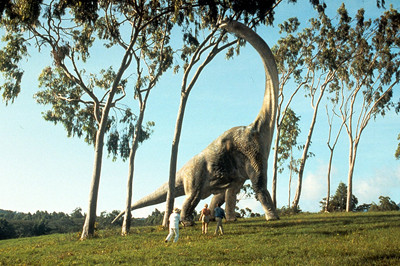 Let's be honest: some people will be enthusiastic to hear about the 4K quality of all four of the Jurassic Park films contained within this set, but most of attention will be directed at the treatment of the original, especially since the Blu-ray presentation never fully lived up to expectations. There are stages of the visuals leading up to the more visually appealing elements in the cinematography: the opening nighttime scene transferring a dinosaur showcases the disc's contrast capabilities, while the next shot of a jungle excavation site wrangles with tricky tan and terra-cotta hues. Already in these scenes, Universal's 2160p, 1.85:1-framed UltraHD treatment begins to impress. Details remain dark but discernible throughout the rustling leaves and hazy cage architecture of that dim opening sequence, while the harsh details and wishy-washy palette of the following scene at the dig site show refinement in both clarity and color solidity. Neither of these are impressive for their abilities in the 4K spectrum, exactly, but in the way they set the tone and indicate the quality that's to come in future sequences, one of tightened details, rich yet appropriate shadows, and adjusted colors.
Let's be honest: some people will be enthusiastic to hear about the 4K quality of all four of the Jurassic Park films contained within this set, but most of attention will be directed at the treatment of the original, especially since the Blu-ray presentation never fully lived up to expectations. There are stages of the visuals leading up to the more visually appealing elements in the cinematography: the opening nighttime scene transferring a dinosaur showcases the disc's contrast capabilities, while the next shot of a jungle excavation site wrangles with tricky tan and terra-cotta hues. Already in these scenes, Universal's 2160p, 1.85:1-framed UltraHD treatment begins to impress. Details remain dark but discernible throughout the rustling leaves and hazy cage architecture of that dim opening sequence, while the harsh details and wishy-washy palette of the following scene at the dig site show refinement in both clarity and color solidity. Neither of these are impressive for their abilities in the 4K spectrum, exactly, but in the way they set the tone and indicate the quality that's to come in future sequences, one of tightened details, rich yet appropriate shadows, and adjusted colors.
Then, the sediment starts getting brushed away from fossils at Grant's dig site, and the prowess of Jurassic Park's 4K treatment truly begins to shine. Now, the color timing doesn't have the heavy, greenish-tan richness often described of the 3D release, leaning closer to the palette from the original Blu-ray with specific differences. Sky blues and foliage greens are given stronger, more organic pop, while the gradation of paint on the modified Ford Explorers and bold colors used in signage throughout the main compound hold both more vibrancy and restraint in respect to the other surrounding shades. From the textures surfaces on the dinosaurs to skin tones on the humans, there's a lot of new nuanced strength here. Yet, that's secondary to the refinement of detail present here. While holding onto a solid veil on film grain, the harshness of clarity -- often appearing boosted in the original Blu-ray, sporting garbled pixels and some edge halos -- has been corrected and enriched throughout, allowing the textures previously visible to have softer, more innate clarity and for a few underlying details, mostly in stone wall textures and dirt debris on clothing, to show off a bit that was previously concealed by the sharpness amplification. Depth is spectacular, contrast leans dark but surprisingly conscientious of underlying details, and the HDR components accentuate the radiance of truck lights and flares.
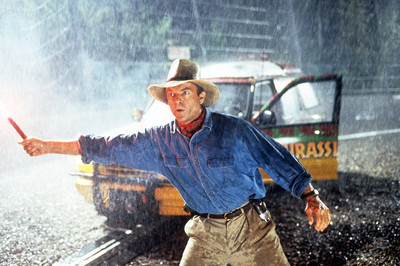 In short, Jurassic Park looks leaps-‘n-bounds superior to its prior releases, but does it retain its reputation as a sonic powerhouse? Absolutely … but its new object-based strengths, presented here in stunning DTS-X heftiness, might not appear in ways one might imagine. Of course, you're going to want to gravitate toward the T-Rex attack sequences, and the stapes that have always sounded good show up in tremendous fashion here: the piercing screech, the weighty bass from footsteps, the unsettling grinding of metal while tearing into a car. Perhaps it's because I've heard the scene so many times, but what stood out in this treatment is the more careful, attuned escalation of thumps while the T-Rex starts stomping around, possessing tighter and more restrained ripples of bass as it goes further away from the main action. Another element that stands out in this track is certain musical elements that might fall outside one's attention during regular viewings, as subtle bass pulses -- almost ‘80s-esque, especially during the opening scene -- and other facets of the score gain more prominence, while still amply balanced against the rest of the track.
In short, Jurassic Park looks leaps-‘n-bounds superior to its prior releases, but does it retain its reputation as a sonic powerhouse? Absolutely … but its new object-based strengths, presented here in stunning DTS-X heftiness, might not appear in ways one might imagine. Of course, you're going to want to gravitate toward the T-Rex attack sequences, and the stapes that have always sounded good show up in tremendous fashion here: the piercing screech, the weighty bass from footsteps, the unsettling grinding of metal while tearing into a car. Perhaps it's because I've heard the scene so many times, but what stood out in this treatment is the more careful, attuned escalation of thumps while the T-Rex starts stomping around, possessing tighter and more restrained ripples of bass as it goes further away from the main action. Another element that stands out in this track is certain musical elements that might fall outside one's attention during regular viewings, as subtle bass pulses -- almost ‘80s-esque, especially during the opening scene -- and other facets of the score gain more prominence, while still amply balanced against the rest of the track.
From a general, overall perspective, Jurassic Park sounds pretty spectacular. Dialogue never struggles with clarity regardless of the situation; whispers during a theme-ride presentation possess more lucidity than in prior tracks, yells being drowned out by helicopters are more discernible, and louder yells have some extra dimensionality to them. Squeals, rattles, snarls, and heavy breaths from dinosaurs are incredibly natural and immersive, while subtler, less tension-focused bass response with their movements are clean and responsive to the surroundings. Understated elements from the track -- brushing debris away from fossils, drips and trickles of water, even the wobble of Jello -- have an impeccable degree of audibility to them, and John Williams' score sounds universally fantastic, sprawling along with specific atmospheric elements across the entire object-based stage. If there's a reservation to be had, it's in the potential overcorrection of bass response with distanced components: a few footsteps that previously had a fair amount of heft are fainter than it seems they should be. But beyond that, and considering the rich strengths that the DTS-X track brings to the table, Jurassic Park deserves a five-star mark in the audio department.
Video:
Audio:
---
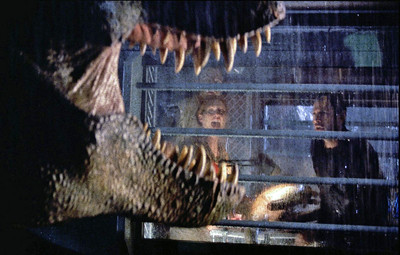 The Lost World offered an inoffensive, shrug-worthy standard Blu-ray experience, one that lacked strong detail and coped with cumbersome flatness and saturation levels … but it was ultimately a tolerable and reasonable cinematic presentation of the cinematography. This 4K effort reveals what's been lost over the years, though, as the 2160p, 1.85:1-framed transfer possesses vastly superior detail retention and a generally more filmic presence. Naturally, the big boost here comes in high-definition clarity, bringing out elements in close-ups, in the digital textures of the dinosaurs' skin and the dense foliage of their surroundings. There's a lot of blooming light in the photography that the 4K disc's grasp on clarity and HDR gets under control, and the contrast levels generally do their job in keeping the copious dark sequences in this film from being overburdened with detail-swallowing shadows. Skin tones possess more warmth and nimbleness to ‘em -- whether we're taking about the humans or the dinos -- and the lushness of the surroundings really pops during daytime sequences.
The Lost World offered an inoffensive, shrug-worthy standard Blu-ray experience, one that lacked strong detail and coped with cumbersome flatness and saturation levels … but it was ultimately a tolerable and reasonable cinematic presentation of the cinematography. This 4K effort reveals what's been lost over the years, though, as the 2160p, 1.85:1-framed transfer possesses vastly superior detail retention and a generally more filmic presence. Naturally, the big boost here comes in high-definition clarity, bringing out elements in close-ups, in the digital textures of the dinosaurs' skin and the dense foliage of their surroundings. There's a lot of blooming light in the photography that the 4K disc's grasp on clarity and HDR gets under control, and the contrast levels generally do their job in keeping the copious dark sequences in this film from being overburdened with detail-swallowing shadows. Skin tones possess more warmth and nimbleness to ‘em -- whether we're taking about the humans or the dinos -- and the lushness of the surroundings really pops during daytime sequences.
The rest of the films in the Jurassic Park franchise have certain moments in their respective audio tracks that really make one lean closer and absorb what's going on, but doing so with The Lost World ends up being more of a struggle. Don't get me wrong: the DTS-X track being rolled out here is a robust action-driven track with plenty of strengths throughout. Similar thuds from the footsteps of the dinosaurs, the crunching and crashing of a vehicle, and the repeated pops of gunfire telegraph plenty of oomph befitting a blockbuster. Dialogue remains clear and distinct as well, regardless of the situation. The degree of been-there, done-that aspects of the track distract from its potency, though, since it ends up essentially being a continuation of most of the aggressive aspects of the original Jurassic Park's design. Perhaps the most unique happens when a T-Rex tears through a subdivision, which emphasizes the disc's delicate special awareness, lack of distortion in quiet moments, and punchiness when needed.
Video:
Audio:
--
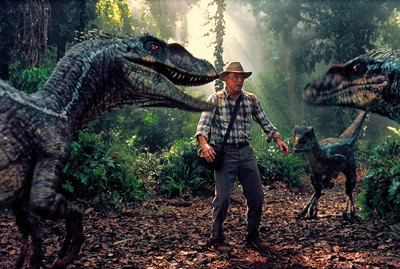 Jurassic Park III sometimes has this weird, washed-out palette going on, which emphasizes pink shades a little too much while Grant and the team toddle through the Isla Sorna wilderness. The positives of the 4K UltraHD comes in a similar manner of getting details under control within the 2160p, 1.85:1-framed transfer, along with HDR's impacts on brighter elements. Foliage, metallic surfaces, and rocky textures have been dramatically tightened with this new HD transfer, yielding much cleaner contours and less harshness due to the lack of need for sharpness boosting. The mild strangeness of the palette ends up getting accentuated by this new scan, though, and despite the upticks in fine detail and general clarity, that elevated red cast and murkiness of contrast takes the presentation down a notch or two. Not all scenes are like this; scenes bathed in light in the jungle, especially if they involve a dinosaur, seem to suffer less from this issue. Contrast levels can also get a little heavy in extremely dark sequences, encroaching on details that should likely be more visible than they are. Easily my least favorite 4K transfer of the bunch, but the improvements in sharpness and film presence do outweigh the negatives.
Jurassic Park III sometimes has this weird, washed-out palette going on, which emphasizes pink shades a little too much while Grant and the team toddle through the Isla Sorna wilderness. The positives of the 4K UltraHD comes in a similar manner of getting details under control within the 2160p, 1.85:1-framed transfer, along with HDR's impacts on brighter elements. Foliage, metallic surfaces, and rocky textures have been dramatically tightened with this new HD transfer, yielding much cleaner contours and less harshness due to the lack of need for sharpness boosting. The mild strangeness of the palette ends up getting accentuated by this new scan, though, and despite the upticks in fine detail and general clarity, that elevated red cast and murkiness of contrast takes the presentation down a notch or two. Not all scenes are like this; scenes bathed in light in the jungle, especially if they involve a dinosaur, seem to suffer less from this issue. Contrast levels can also get a little heavy in extremely dark sequences, encroaching on details that should likely be more visible than they are. Easily my least favorite 4K transfer of the bunch, but the improvements in sharpness and film presence do outweigh the negatives.
With a new perspective on the Jurassic Park idea -- concentrate on the horror and suspense as much as possible -- also comes some new tricks up the sound design's sleeves, presented here in a fierce DTS-X audio treatment. Gentle, yet firm emphasis on dialogue and speaking spaces eventually moves on and lands into the tropical realm of dinosaurs, and that's the point where the track also takes off as a suspense-driven, yet franchise-inspired affair. Rustling in the woods, the screeching of raptors, and the raucous behavior of embattled predatory dinosaurs create a consistent sense of unease that's persistently elevated by the track's fluid dimensionality, accentuating the higher-end clarity and emphasizing the locations of the beasts themselves. A few new elements emerge in this track, though, such as the high-pitched ringing of a phone that plays a key, partly humorous role in what's happening and the flapping of dinosaur wings, both of which carry unique, more modern high-end crispness to ‘em and, once again, benefit from the object-based spatial design. It's clear, mostly lacks distortion (a few elements hit the upper end of the track somewhat clumsily), and stands above the visual transfer.
Video:
Audio:
--
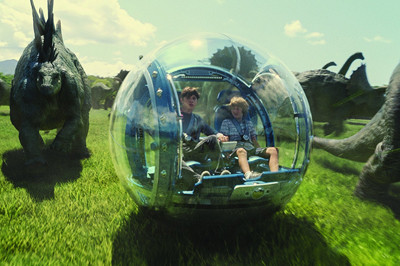 Jurassic World is, perhaps, the most uninteresting of the batch being covered here for technical merits, since it's hard to imagine that a three-year-old Hollywood blockbuster that received a pretty stellar standard Blu-ray presentation -- one that now has a sequel -- would, in some way, get shafted on the 4K front. Of course, it didn't: the uniquely-framed 2.00:1, 2160p transfer is an absolute stunner from Universal. Skin tones have heaps of life to ‘em, foliage runs the gamut of verdant green shades, and subtle gradations of tone within the dinosaurs' colorings are extremely well-handled; that subtle streak of blue in Owen's favorite velociraptor looks great. An endless supply of textures can be discerned throughout the park and its visitors, especially in the copious close-ups of Chris Pratt and Bryce Dallas-Howard, while the digital textures that give life to the dinosaurs are solid and sharp no matter how much movement's going on. Contrast levels are impeccable, with the series' signature nighttime scenes preserving a splendid degree of detail in the surrounding trees/bushes and animals lurking within. A little mild flatness/smoothness notwithstanding, Jurassic World stuns in this 4K transfer.
Jurassic World is, perhaps, the most uninteresting of the batch being covered here for technical merits, since it's hard to imagine that a three-year-old Hollywood blockbuster that received a pretty stellar standard Blu-ray presentation -- one that now has a sequel -- would, in some way, get shafted on the 4K front. Of course, it didn't: the uniquely-framed 2.00:1, 2160p transfer is an absolute stunner from Universal. Skin tones have heaps of life to ‘em, foliage runs the gamut of verdant green shades, and subtle gradations of tone within the dinosaurs' colorings are extremely well-handled; that subtle streak of blue in Owen's favorite velociraptor looks great. An endless supply of textures can be discerned throughout the park and its visitors, especially in the copious close-ups of Chris Pratt and Bryce Dallas-Howard, while the digital textures that give life to the dinosaurs are solid and sharp no matter how much movement's going on. Contrast levels are impeccable, with the series' signature nighttime scenes preserving a splendid degree of detail in the surrounding trees/bushes and animals lurking within. A little mild flatness/smoothness notwithstanding, Jurassic World stuns in this 4K transfer.
While there's nostalgia and precision involved with the original Jurassic Park's sound design, it's hard to argue against this sound treatment being the triumphant beast of the bunch, packing loads of ferocity through the DTS-X object-based audio. The staples of the franchise are, of course, in full force: the snarls of a huge predator dinosaur, the clamping of teeth, and the sizzle of a flair taps into strong clarity that's enhanced by the space awareness of the new audio format, spreading across the channels with nimble -- if, occasionally, center-focused -- fluidity. There's a lot of new ingredients mixed in, too, from the subtle whirr of a transport ball's rolling to the heavy pitter-patter of velociraptor feet sprinting alongside a motorcycle's humming, which strong, deft clarity across the front channels and traveling to the back. Dialogue never has any audibility issues, whether frightened tourists or equally frightened dinosaurs are swarming around or not, and the music rides carefully alongside the action-movie bluster powering the rest of the film, spliced together into a balanced yet vigorous track that stays true to the Jurassic Park brand.
Video:
Audio:
Special Features:
It's obvious that a lot of effort went into the new 4K transfers of the Jurassic Park film series, and that plenty of thought went into the design of their "limited edition" packaging that houses all of it. On top of that, there's already a metric ton of extras available on the standard Blu-ray releases of all the films … hours upon hours of material to dig through. Therefore, it's even more understandable than normal that Universal have opted to use the already-created discs from previous sets to fill the "special features" quota, cobbling together the black-topped discs from the Ultimate Trilogy and the black-topped disc from the Jurassic World to cover those bases. One interesting note, though: the Commentary with the Special Effect Team for Jurassic Park III has been included on the 4k disc and can be played alongside that presentation.
Below, you'll find the available extras and the time codes for each of the films' extras:
Final Thoughts:
While the other three films in the Jurassic Park franchise may struggle to hold up with repeat viewings, it's hard to deny the greatness of what Steven Spielberg constructed with the original, and the spirit of that film adds fuel to the whole viewing experience of watching the rest of ‘em. The Lost World attempts to one-up the original in both dinosaur action and themes, but struggles while away from the main island. Jurassic Park III strips down its intentions to a rescue horror-thriller involving dinosaurs, but its straightforwardness doesn't command the same sort of attention as its bigger-thinking precursors. And while Jurassic World succeeds in bringing the concept back into a volatile theme-park environment, it branches into zany science-fiction a bit too much in order for the premise to hold onto its practicality. They all have their positive aspects, some more than others, but the amazement, exhilaration, and seemingly timeless execution of the original Jurassic Park doesn't seem to weaken with time, as its ideas and suspense are every bit as potent as they were a quarter-century ago. And finally, it both looks and sounds great in the same package this time! The 4K Ultra HD visual transfers offered here range for reputable improvement to downright phenomenal, the DTS-X tracks are universally spectacular, and the extras made available on the prior Blu-ray discs offer a trove of goodies to unearth. Highly Recommended, at least until a most cost-efficient way of just owning the original comes along.
Thomas Spurlin, Staff Reviewer -- DVDTalk Reviews | Personal Blog/Site
 Dinosaurs have generated widespread, some might say mainstream fascination for at least a century now, and it's easy to understand the reasons behind this. With modern perceptions that hefty crocodiles and long constricting snakes are the largest, most dangerous reptiles occupying the earth -- and fantasy stories recall dragons soaring through the sky -- it's no wonder that tales of real-life monsters stomping across continents strike a chord with children and adults alike. The popularity started to really take off in the ‘70s and ‘80s, though, with kids choosing their favorite dinosaur types, rocking t-shirts with them on the front and watching any number of dino-themed shows, cartoons, and specials out there. Me? I was a Triceratops kid who binged "Dinosaurs, Dinosaurs, Dinosaurs" until the VHS tape fell apart and endlessly played with Dino-Riders toys. Therefore, when Steven Spielberg's Jurassic Park first showed up in theaters for the slightly-older version of myself to see, I was left in awe. Those were real dinosaurs ...!
Dinosaurs have generated widespread, some might say mainstream fascination for at least a century now, and it's easy to understand the reasons behind this. With modern perceptions that hefty crocodiles and long constricting snakes are the largest, most dangerous reptiles occupying the earth -- and fantasy stories recall dragons soaring through the sky -- it's no wonder that tales of real-life monsters stomping across continents strike a chord with children and adults alike. The popularity started to really take off in the ‘70s and ‘80s, though, with kids choosing their favorite dinosaur types, rocking t-shirts with them on the front and watching any number of dino-themed shows, cartoons, and specials out there. Me? I was a Triceratops kid who binged "Dinosaurs, Dinosaurs, Dinosaurs" until the VHS tape fell apart and endlessly played with Dino-Riders toys. Therefore, when Steven Spielberg's Jurassic Park first showed up in theaters for the slightly-older version of myself to see, I was left in awe. Those were real dinosaurs ...! Since then, visual effects have advanced beyond measure and Hollywood blockbusters have grown even bigger and more intense, but something else has gradually happened: amid other toy franchises, superhero fandom, and other modern distractions, the mystique of dinosaurs has also faded with time. That's on a broad scale, though: nostalgic adults still get wrapped up in the grandeur of the beasts from the prehistoric era, while those modern kids whom dinosaurs speak to -- perhaps future paleontologists; the next Jack Horner or Mary Anning? -- are still quite enthusiastic about it, maybe even more so than past generations. Even with a little bit of fading mainstream interest, that's why Jurassic Park ceases to become extinct, getting revived by Jurassic World a few years back after being on hiatus for about a decade and a half. Even though none of the films that followed have been able to match the awe generated by the original, each one attempts something innovative while trying to find a way to keep the franchise alive, to … uh, mixed successes and failures. But boy, does the original still hold up.
 Two-and-a-half decades have gone by since Jurassic Park trampled onto the scene, yet it's remarkable how much still works within Steven Spielberg's modified adaptation of Michael Crichton's book. As Sam Neill's Alan Grant and a cluster of other scientists -- Laura Dern as a paleobotanist; Jeff Goldblum as a self-described "chaotician" -- evaluate what's essentially a prehistoric zoo featuring genetically resurrected dinosaurs roaming the grounds, we're confronted by dated technology, both the tools being used by the scientists and the digital creatures rendered by Industrial Light and Magic. While the execution of the story's extrapolations on DNA engineering and computer systems are handled with informed, future-aware simplicity, Spielberg and his team conscientiously blend practical and digital effects that respect the enormity of what's occupying the island of Isla Nublar. Following the scientists as they gain a grasp on what they're witnessing, the story then organically branches into the themes involved with their wonder, about tampering with natural order and how that plays into consumerism.
Two-and-a-half decades have gone by since Jurassic Park trampled onto the scene, yet it's remarkable how much still works within Steven Spielberg's modified adaptation of Michael Crichton's book. As Sam Neill's Alan Grant and a cluster of other scientists -- Laura Dern as a paleobotanist; Jeff Goldblum as a self-described "chaotician" -- evaluate what's essentially a prehistoric zoo featuring genetically resurrected dinosaurs roaming the grounds, we're confronted by dated technology, both the tools being used by the scientists and the digital creatures rendered by Industrial Light and Magic. While the execution of the story's extrapolations on DNA engineering and computer systems are handled with informed, future-aware simplicity, Spielberg and his team conscientiously blend practical and digital effects that respect the enormity of what's occupying the island of Isla Nublar. Following the scientists as they gain a grasp on what they're witnessing, the story then organically branches into the themes involved with their wonder, about tampering with natural order and how that plays into consumerism. Of course, what works best in Jurassic Park is the suspense generated by dinosaurs unleashed, elevated by well-crafted adult and child characters coping with the dangers when those barriers separating humans from prehistoric "monsters" malfunction. Researched, yet exaggerated application of info about the prehistoric animals feed into the tension, while differences in age, knowledge level, and degrees of self-preservation create potential human victims worth rooting for (and against). Spielberg pushes the envelope with the PG-13 rating -- there's some blood-‘n-guts and violent death here -- and executes a quasi-horror film in the second half that's genuinely informed by the philosophical ideas explored at the start, with scientist Alan Grant proving to be a marvelous unlikely hero as he uses his pro book-smarts to protect others. Complimented by natural one-liner humor that eases tension, kid characters that aren't obnoxious, and a perspective on dinosaurs that never loses curiosity and amazement, Jurassic Park's concept is brought to life with the pinnacles of what Spielberg has to offer. Jurassic Park:

 Unfortunately, Steven Spielberg has the distinction of being responsible for both the best entry in the franchise and the worst, following up the enormous success of the original with The Lost World, another semi-adaptation of a bestselling Michael Crichton book. This time, however, Spielberg and writer David Koepp venture much further away from the source material in pursuit of the double agendas that often accompany sequels, sticking to the bare skeleton of the story involving Jeff Goldblum's chaotician Ian Malcolm as this one's brains-over-brawn protagonist. Along with a team commissioned by John Hammond, he returns to the area where the events of the first film wreaked havoc … only onto a second island, Isla Sorna, where even more dinosaurs were created and left to do their thing. Obligatory cameos featuring the original cast, clumsy exposition introducing Ian Malcolm's current girlfriend (Julianne Moore) and neglected daughter, and forced scenarios designed to get the charismatic scientist -- and those he loves -- around dinosaurs again reek of the moving parts of a cash-in blockbuster.
Unfortunately, Steven Spielberg has the distinction of being responsible for both the best entry in the franchise and the worst, following up the enormous success of the original with The Lost World, another semi-adaptation of a bestselling Michael Crichton book. This time, however, Spielberg and writer David Koepp venture much further away from the source material in pursuit of the double agendas that often accompany sequels, sticking to the bare skeleton of the story involving Jeff Goldblum's chaotician Ian Malcolm as this one's brains-over-brawn protagonist. Along with a team commissioned by John Hammond, he returns to the area where the events of the first film wreaked havoc … only onto a second island, Isla Sorna, where even more dinosaurs were created and left to do their thing. Obligatory cameos featuring the original cast, clumsy exposition introducing Ian Malcolm's current girlfriend (Julianne Moore) and neglected daughter, and forced scenarios designed to get the charismatic scientist -- and those he loves -- around dinosaurs again reek of the moving parts of a cash-in blockbuster. Once on Isla Sorna, The Lost World simply attempts to go bigger and bolder than what was present in the original film, both in the scale of the visual effects and the themes involved with why everyone's there and risking their lives. Spielberg trades respect for the corporeal grandness of dinosaurs for more inventive usage of their physicality, and the embellished digital wizardly accompanying that decision detracts from the attention once given to the prehistoric animals' material realism. While this goes on, the heavily-modified script employs ham-fisted ideologies about those that study nature versus those that yearn to hunt and control it, with the director's normal attentiveness toward characterization giving way to stereotypes, mustache-twirling villains, and hokey use of backstories to move the plot along. Upon the arrival of yet another Goldblum one-liner after a pint-sized gymnast defeats a prehistoric predator, The Lost World loses its remaining clutch on integrity … and that's before Spielberg unabashedly lets a T-Rex loose on the populated mainland, resulting in a dopey cinematic mess of epic proportions. The Lost World: Jurassic Park:

 The lackluster reception to The Lost World didn't hit the brakes on the dino-franchise's momentum, but it did keep Spielberg -- and, for the most part, Crichton -- at arm's length from the third installment, Jurassic Park III. Not based on a prior novel, but featuring secondary scenes plucked from Crichton's books, this one revisits Alan Grant as the protagonist, who gets similarly hornswoggled into returning to the dangerous dinosaur-overrun islands some few-hundred miles south of Costa Rica. This time, however, the pursuits are independent of John Hammond and his bioengineering outfit InGen, in which the prospect of further funding his research draws Grant into a haphazard rescue mission for a young boy lost there. Another first, this installment directed by The Rocketeer's Joe Johnson becomes the first -- and, so far, the only -- one that clocks in at less than two hours; without the credits, it's less than an hour and a half. It's obvious what was chopped away to get it that short, as this one avoids intellectual undertones and replaces much of that with "humorous" banter featuring William H. Macy and Tea Leoni as awkward, concerned parents.
The lackluster reception to The Lost World didn't hit the brakes on the dino-franchise's momentum, but it did keep Spielberg -- and, for the most part, Crichton -- at arm's length from the third installment, Jurassic Park III. Not based on a prior novel, but featuring secondary scenes plucked from Crichton's books, this one revisits Alan Grant as the protagonist, who gets similarly hornswoggled into returning to the dangerous dinosaur-overrun islands some few-hundred miles south of Costa Rica. This time, however, the pursuits are independent of John Hammond and his bioengineering outfit InGen, in which the prospect of further funding his research draws Grant into a haphazard rescue mission for a young boy lost there. Another first, this installment directed by The Rocketeer's Joe Johnson becomes the first -- and, so far, the only -- one that clocks in at less than two hours; without the credits, it's less than an hour and a half. It's obvious what was chopped away to get it that short, as this one avoids intellectual undertones and replaces much of that with "humorous" banter featuring William H. Macy and Tea Leoni as awkward, concerned parents. With Joe Johnson guiding the story into the territory of "let's not take this setting so damn seriously", Jurassic Park III becomes content with being this straight-up, dinosaur-fueled horror show, with a new type of genus to the series -- the Spinosaurus, a hearty competitor to the T-Rex in size and viciousness -- serving as its bloodthirsty killer. This isn't a smart movie, especially when it comes to depicting the advanced communication abilities of velociraptors, but it's hard to deny the effectiveness of the tension generated by the overgrown island and the ways in which the characters must evade prehistoric predators throughout it. Whether it's okay for a Jurassic Park movie to be solely interested in those base cinematic purposes is another matter; the shorter runtime, simpler objectives, and willingness to fudge science for dramatic effect certainly gives it a different attitude. But, when one lumps Jurassic Park III together with loose dinosaur escapades like The Land That Time Forgot or chaotic family-fueled adventures like Johnson's Jumanji, Dr. Grant and that theme song make it … well, not too bad. Jurassic Park III:

 Raking in half the box-office of the previous one, Jurassic Park III didn't instill much confidence in a fourth installment in the franchise, despite Spielberg and others bouncing creative ideas about where it could go. Scripts, producers, and directors churned in a way that put Jurassic Park on ice for well over a decade … until the ideas finally came together for Jurassic World. The premise itself creates a hurdle for those who've followed the story, though: taking place two decades after Jurassic Park, it transpires in a universe where the harrowing events at Isla Nublar weren't enough of a deterrent to keep entrepreneurs and bioengineers from making a modified version of John Hammond's park. All that death and destruction from malfunctioning equipment and intelligent dinosaurs? Nah, that could never happen again, not with modern technology and improved security measures. Thus, Jurassic World™ was formed, a zoo-like epicenter of consumerism where kids ride baby triceratops, people sit at a Sea World-like tank to watch a Mesosaurus jump up and eat a dangling great white shark, and adventurous tourists ride alongside other dinos in motorized hamster balls.
Raking in half the box-office of the previous one, Jurassic Park III didn't instill much confidence in a fourth installment in the franchise, despite Spielberg and others bouncing creative ideas about where it could go. Scripts, producers, and directors churned in a way that put Jurassic Park on ice for well over a decade … until the ideas finally came together for Jurassic World. The premise itself creates a hurdle for those who've followed the story, though: taking place two decades after Jurassic Park, it transpires in a universe where the harrowing events at Isla Nublar weren't enough of a deterrent to keep entrepreneurs and bioengineers from making a modified version of John Hammond's park. All that death and destruction from malfunctioning equipment and intelligent dinosaurs? Nah, that could never happen again, not with modern technology and improved security measures. Thus, Jurassic World™ was formed, a zoo-like epicenter of consumerism where kids ride baby triceratops, people sit at a Sea World-like tank to watch a Mesosaurus jump up and eat a dangling great white shark, and adventurous tourists ride alongside other dinos in motorized hamster balls. If you're able to come to grips with that -- or mentally work things out so that it's a slightly alternate universe -- director Colin Trevorrow has a shiny, wild environment of dinosaurs both old and new to show those willing to explore Jurassic World. Buttoned-up executive Claire (Bryce Dallas-Howard) oversees operations from a control room filled with computer whizzes, who notices trouble brewing at the paddock where a brand-new dinosaur resides. When I say "brand-new" dinosaur, I mean it: to accommodate for waning interest in regular-ole dinosaurs (a little bit of a meta wink there), the bioengineers have cooked up a bigger, scarier modified breed to attract new visitors … and investors. This officially takes the Jurassic Park universe in a warped, vastly more sci-fi oriented direction than the relative practicality of the original films, and it's up to rugged velociraptor wrangler Owen (Chris Pratt) to sniff out potential problems with the new beast's storage area before it's opened to the public. This will be a shocker, I'm sure, but something goes wrong with its paddock, exposing Jurassic World to its wrath.
Yes, Jurassic World improves upon the previous two entries in this franchise, once again getting back to the wide-eyed wonder of the first film and, by extension, introducing a new generation of movie-goers to the potential that it holds, all while setting up an atmosphere ripe for a monster to tear apart. There's some numb-skulled decisions being made on the park's grounds, though, which take it down a few notches, and they never really stop staring down the audience throughout. Trusting in loosely-trained velociraptors, forgetting about a tracker embedded in a dinosaur before going into an empty paddock to search for it, and the idea of this absurd, almost B-movie cocktail of genetics thrown together to create an insanely overpowered predator -- "Your scientists were so preoccupied with whether they could, they didn't stop to think if they should." -- do some major damage to credibility here. However, with help from a similar suspension of disbelief given to Jurassic Park III, what's underneath can be an amusing, thrilling adventure with similar emotional and thematic tones to the original. It's absurd that things got to this point, but at least Jurassic World knows what to do with it. Jurassic World:

The 4K Blu-ray:
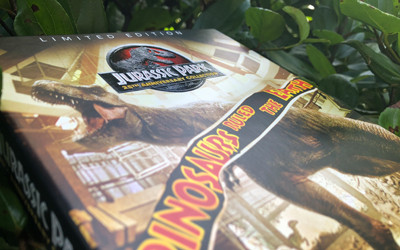 | 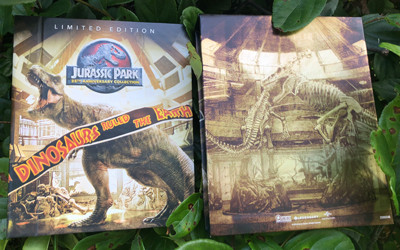 |
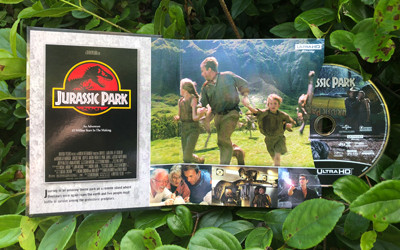 | 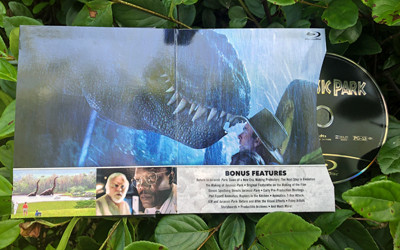 |
Steven Spielberg's original Jurassic Park has endured a complex, yet profitable life on home-media. There was a time when the DTS version of the Collector's Edition was a sought-after commodity, and I can attest to the potency of that audio track, as the T-Rex paddock sequence was frequently used as demo material for whatever stage that my early evolving home-theater was in at a given time. The heft and tightness of the bass when the dinosaur stomped, the high-end crispness of snapped wires, and the sprawling range across the board when it screamed and snarled delivered just about everything one could want from that kind of scene. Since, I've enjoyed the Blu-ray's presentation of the film, yet while the audio delivered a punch, the harsher details, elevated contrast, and flat colors resulted in a … meh visual experience. There were richer, cleaner transfers in existence out there -- the 3D Blu-ray presentation of the film suggested as much -- but the pieces haven't aligned into one great package yet.
That is, until now … but more on that later. To coincide with the release of Jurassic World: Fallen Kingdom, Universal have bundled together the old, black-topped Blu-ray discs from the Ultimate Trilogy -- the non-3D discs -- with a series of new 4K UltraHD discs to form this 25th Anniversary Collection. A hard slipcase with a matte finish and slightly metallic lettering houses a book-style packaging, to which the discs slide in and out of slits in thicker "pages" within. Each of these pages features still photographs from the respective films in each slot, while the pages for the Blu-ray discs list the extras available on ‘em. This 25th Anniversary Edition doesn't try to pull what other releases from Universal have done before: the whole "leaving an empty placeholder slot for the latest film" deal. It's just the 4K discs, the Blu-ray discs, and a very handsome, compact, well-made package for the prior films.
Video and Audio:
 Let's be honest: some people will be enthusiastic to hear about the 4K quality of all four of the Jurassic Park films contained within this set, but most of attention will be directed at the treatment of the original, especially since the Blu-ray presentation never fully lived up to expectations. There are stages of the visuals leading up to the more visually appealing elements in the cinematography: the opening nighttime scene transferring a dinosaur showcases the disc's contrast capabilities, while the next shot of a jungle excavation site wrangles with tricky tan and terra-cotta hues. Already in these scenes, Universal's 2160p, 1.85:1-framed UltraHD treatment begins to impress. Details remain dark but discernible throughout the rustling leaves and hazy cage architecture of that dim opening sequence, while the harsh details and wishy-washy palette of the following scene at the dig site show refinement in both clarity and color solidity. Neither of these are impressive for their abilities in the 4K spectrum, exactly, but in the way they set the tone and indicate the quality that's to come in future sequences, one of tightened details, rich yet appropriate shadows, and adjusted colors.
Let's be honest: some people will be enthusiastic to hear about the 4K quality of all four of the Jurassic Park films contained within this set, but most of attention will be directed at the treatment of the original, especially since the Blu-ray presentation never fully lived up to expectations. There are stages of the visuals leading up to the more visually appealing elements in the cinematography: the opening nighttime scene transferring a dinosaur showcases the disc's contrast capabilities, while the next shot of a jungle excavation site wrangles with tricky tan and terra-cotta hues. Already in these scenes, Universal's 2160p, 1.85:1-framed UltraHD treatment begins to impress. Details remain dark but discernible throughout the rustling leaves and hazy cage architecture of that dim opening sequence, while the harsh details and wishy-washy palette of the following scene at the dig site show refinement in both clarity and color solidity. Neither of these are impressive for their abilities in the 4K spectrum, exactly, but in the way they set the tone and indicate the quality that's to come in future sequences, one of tightened details, rich yet appropriate shadows, and adjusted colors. Then, the sediment starts getting brushed away from fossils at Grant's dig site, and the prowess of Jurassic Park's 4K treatment truly begins to shine. Now, the color timing doesn't have the heavy, greenish-tan richness often described of the 3D release, leaning closer to the palette from the original Blu-ray with specific differences. Sky blues and foliage greens are given stronger, more organic pop, while the gradation of paint on the modified Ford Explorers and bold colors used in signage throughout the main compound hold both more vibrancy and restraint in respect to the other surrounding shades. From the textures surfaces on the dinosaurs to skin tones on the humans, there's a lot of new nuanced strength here. Yet, that's secondary to the refinement of detail present here. While holding onto a solid veil on film grain, the harshness of clarity -- often appearing boosted in the original Blu-ray, sporting garbled pixels and some edge halos -- has been corrected and enriched throughout, allowing the textures previously visible to have softer, more innate clarity and for a few underlying details, mostly in stone wall textures and dirt debris on clothing, to show off a bit that was previously concealed by the sharpness amplification. Depth is spectacular, contrast leans dark but surprisingly conscientious of underlying details, and the HDR components accentuate the radiance of truck lights and flares.
 In short, Jurassic Park looks leaps-‘n-bounds superior to its prior releases, but does it retain its reputation as a sonic powerhouse? Absolutely … but its new object-based strengths, presented here in stunning DTS-X heftiness, might not appear in ways one might imagine. Of course, you're going to want to gravitate toward the T-Rex attack sequences, and the stapes that have always sounded good show up in tremendous fashion here: the piercing screech, the weighty bass from footsteps, the unsettling grinding of metal while tearing into a car. Perhaps it's because I've heard the scene so many times, but what stood out in this treatment is the more careful, attuned escalation of thumps while the T-Rex starts stomping around, possessing tighter and more restrained ripples of bass as it goes further away from the main action. Another element that stands out in this track is certain musical elements that might fall outside one's attention during regular viewings, as subtle bass pulses -- almost ‘80s-esque, especially during the opening scene -- and other facets of the score gain more prominence, while still amply balanced against the rest of the track.
In short, Jurassic Park looks leaps-‘n-bounds superior to its prior releases, but does it retain its reputation as a sonic powerhouse? Absolutely … but its new object-based strengths, presented here in stunning DTS-X heftiness, might not appear in ways one might imagine. Of course, you're going to want to gravitate toward the T-Rex attack sequences, and the stapes that have always sounded good show up in tremendous fashion here: the piercing screech, the weighty bass from footsteps, the unsettling grinding of metal while tearing into a car. Perhaps it's because I've heard the scene so many times, but what stood out in this treatment is the more careful, attuned escalation of thumps while the T-Rex starts stomping around, possessing tighter and more restrained ripples of bass as it goes further away from the main action. Another element that stands out in this track is certain musical elements that might fall outside one's attention during regular viewings, as subtle bass pulses -- almost ‘80s-esque, especially during the opening scene -- and other facets of the score gain more prominence, while still amply balanced against the rest of the track. From a general, overall perspective, Jurassic Park sounds pretty spectacular. Dialogue never struggles with clarity regardless of the situation; whispers during a theme-ride presentation possess more lucidity than in prior tracks, yells being drowned out by helicopters are more discernible, and louder yells have some extra dimensionality to them. Squeals, rattles, snarls, and heavy breaths from dinosaurs are incredibly natural and immersive, while subtler, less tension-focused bass response with their movements are clean and responsive to the surroundings. Understated elements from the track -- brushing debris away from fossils, drips and trickles of water, even the wobble of Jello -- have an impeccable degree of audibility to them, and John Williams' score sounds universally fantastic, sprawling along with specific atmospheric elements across the entire object-based stage. If there's a reservation to be had, it's in the potential overcorrection of bass response with distanced components: a few footsteps that previously had a fair amount of heft are fainter than it seems they should be. But beyond that, and considering the rich strengths that the DTS-X track brings to the table, Jurassic Park deserves a five-star mark in the audio department.
Video:

Audio:

---
 The Lost World offered an inoffensive, shrug-worthy standard Blu-ray experience, one that lacked strong detail and coped with cumbersome flatness and saturation levels … but it was ultimately a tolerable and reasonable cinematic presentation of the cinematography. This 4K effort reveals what's been lost over the years, though, as the 2160p, 1.85:1-framed transfer possesses vastly superior detail retention and a generally more filmic presence. Naturally, the big boost here comes in high-definition clarity, bringing out elements in close-ups, in the digital textures of the dinosaurs' skin and the dense foliage of their surroundings. There's a lot of blooming light in the photography that the 4K disc's grasp on clarity and HDR gets under control, and the contrast levels generally do their job in keeping the copious dark sequences in this film from being overburdened with detail-swallowing shadows. Skin tones possess more warmth and nimbleness to ‘em -- whether we're taking about the humans or the dinos -- and the lushness of the surroundings really pops during daytime sequences.
The Lost World offered an inoffensive, shrug-worthy standard Blu-ray experience, one that lacked strong detail and coped with cumbersome flatness and saturation levels … but it was ultimately a tolerable and reasonable cinematic presentation of the cinematography. This 4K effort reveals what's been lost over the years, though, as the 2160p, 1.85:1-framed transfer possesses vastly superior detail retention and a generally more filmic presence. Naturally, the big boost here comes in high-definition clarity, bringing out elements in close-ups, in the digital textures of the dinosaurs' skin and the dense foliage of their surroundings. There's a lot of blooming light in the photography that the 4K disc's grasp on clarity and HDR gets under control, and the contrast levels generally do their job in keeping the copious dark sequences in this film from being overburdened with detail-swallowing shadows. Skin tones possess more warmth and nimbleness to ‘em -- whether we're taking about the humans or the dinos -- and the lushness of the surroundings really pops during daytime sequences. The rest of the films in the Jurassic Park franchise have certain moments in their respective audio tracks that really make one lean closer and absorb what's going on, but doing so with The Lost World ends up being more of a struggle. Don't get me wrong: the DTS-X track being rolled out here is a robust action-driven track with plenty of strengths throughout. Similar thuds from the footsteps of the dinosaurs, the crunching and crashing of a vehicle, and the repeated pops of gunfire telegraph plenty of oomph befitting a blockbuster. Dialogue remains clear and distinct as well, regardless of the situation. The degree of been-there, done-that aspects of the track distract from its potency, though, since it ends up essentially being a continuation of most of the aggressive aspects of the original Jurassic Park's design. Perhaps the most unique happens when a T-Rex tears through a subdivision, which emphasizes the disc's delicate special awareness, lack of distortion in quiet moments, and punchiness when needed.
Video:

Audio:

--
 Jurassic Park III sometimes has this weird, washed-out palette going on, which emphasizes pink shades a little too much while Grant and the team toddle through the Isla Sorna wilderness. The positives of the 4K UltraHD comes in a similar manner of getting details under control within the 2160p, 1.85:1-framed transfer, along with HDR's impacts on brighter elements. Foliage, metallic surfaces, and rocky textures have been dramatically tightened with this new HD transfer, yielding much cleaner contours and less harshness due to the lack of need for sharpness boosting. The mild strangeness of the palette ends up getting accentuated by this new scan, though, and despite the upticks in fine detail and general clarity, that elevated red cast and murkiness of contrast takes the presentation down a notch or two. Not all scenes are like this; scenes bathed in light in the jungle, especially if they involve a dinosaur, seem to suffer less from this issue. Contrast levels can also get a little heavy in extremely dark sequences, encroaching on details that should likely be more visible than they are. Easily my least favorite 4K transfer of the bunch, but the improvements in sharpness and film presence do outweigh the negatives.
Jurassic Park III sometimes has this weird, washed-out palette going on, which emphasizes pink shades a little too much while Grant and the team toddle through the Isla Sorna wilderness. The positives of the 4K UltraHD comes in a similar manner of getting details under control within the 2160p, 1.85:1-framed transfer, along with HDR's impacts on brighter elements. Foliage, metallic surfaces, and rocky textures have been dramatically tightened with this new HD transfer, yielding much cleaner contours and less harshness due to the lack of need for sharpness boosting. The mild strangeness of the palette ends up getting accentuated by this new scan, though, and despite the upticks in fine detail and general clarity, that elevated red cast and murkiness of contrast takes the presentation down a notch or two. Not all scenes are like this; scenes bathed in light in the jungle, especially if they involve a dinosaur, seem to suffer less from this issue. Contrast levels can also get a little heavy in extremely dark sequences, encroaching on details that should likely be more visible than they are. Easily my least favorite 4K transfer of the bunch, but the improvements in sharpness and film presence do outweigh the negatives. With a new perspective on the Jurassic Park idea -- concentrate on the horror and suspense as much as possible -- also comes some new tricks up the sound design's sleeves, presented here in a fierce DTS-X audio treatment. Gentle, yet firm emphasis on dialogue and speaking spaces eventually moves on and lands into the tropical realm of dinosaurs, and that's the point where the track also takes off as a suspense-driven, yet franchise-inspired affair. Rustling in the woods, the screeching of raptors, and the raucous behavior of embattled predatory dinosaurs create a consistent sense of unease that's persistently elevated by the track's fluid dimensionality, accentuating the higher-end clarity and emphasizing the locations of the beasts themselves. A few new elements emerge in this track, though, such as the high-pitched ringing of a phone that plays a key, partly humorous role in what's happening and the flapping of dinosaur wings, both of which carry unique, more modern high-end crispness to ‘em and, once again, benefit from the object-based spatial design. It's clear, mostly lacks distortion (a few elements hit the upper end of the track somewhat clumsily), and stands above the visual transfer.
Video:

Audio:

--
 Jurassic World is, perhaps, the most uninteresting of the batch being covered here for technical merits, since it's hard to imagine that a three-year-old Hollywood blockbuster that received a pretty stellar standard Blu-ray presentation -- one that now has a sequel -- would, in some way, get shafted on the 4K front. Of course, it didn't: the uniquely-framed 2.00:1, 2160p transfer is an absolute stunner from Universal. Skin tones have heaps of life to ‘em, foliage runs the gamut of verdant green shades, and subtle gradations of tone within the dinosaurs' colorings are extremely well-handled; that subtle streak of blue in Owen's favorite velociraptor looks great. An endless supply of textures can be discerned throughout the park and its visitors, especially in the copious close-ups of Chris Pratt and Bryce Dallas-Howard, while the digital textures that give life to the dinosaurs are solid and sharp no matter how much movement's going on. Contrast levels are impeccable, with the series' signature nighttime scenes preserving a splendid degree of detail in the surrounding trees/bushes and animals lurking within. A little mild flatness/smoothness notwithstanding, Jurassic World stuns in this 4K transfer.
Jurassic World is, perhaps, the most uninteresting of the batch being covered here for technical merits, since it's hard to imagine that a three-year-old Hollywood blockbuster that received a pretty stellar standard Blu-ray presentation -- one that now has a sequel -- would, in some way, get shafted on the 4K front. Of course, it didn't: the uniquely-framed 2.00:1, 2160p transfer is an absolute stunner from Universal. Skin tones have heaps of life to ‘em, foliage runs the gamut of verdant green shades, and subtle gradations of tone within the dinosaurs' colorings are extremely well-handled; that subtle streak of blue in Owen's favorite velociraptor looks great. An endless supply of textures can be discerned throughout the park and its visitors, especially in the copious close-ups of Chris Pratt and Bryce Dallas-Howard, while the digital textures that give life to the dinosaurs are solid and sharp no matter how much movement's going on. Contrast levels are impeccable, with the series' signature nighttime scenes preserving a splendid degree of detail in the surrounding trees/bushes and animals lurking within. A little mild flatness/smoothness notwithstanding, Jurassic World stuns in this 4K transfer. While there's nostalgia and precision involved with the original Jurassic Park's sound design, it's hard to argue against this sound treatment being the triumphant beast of the bunch, packing loads of ferocity through the DTS-X object-based audio. The staples of the franchise are, of course, in full force: the snarls of a huge predator dinosaur, the clamping of teeth, and the sizzle of a flair taps into strong clarity that's enhanced by the space awareness of the new audio format, spreading across the channels with nimble -- if, occasionally, center-focused -- fluidity. There's a lot of new ingredients mixed in, too, from the subtle whirr of a transport ball's rolling to the heavy pitter-patter of velociraptor feet sprinting alongside a motorcycle's humming, which strong, deft clarity across the front channels and traveling to the back. Dialogue never has any audibility issues, whether frightened tourists or equally frightened dinosaurs are swarming around or not, and the music rides carefully alongside the action-movie bluster powering the rest of the film, spliced together into a balanced yet vigorous track that stays true to the Jurassic Park brand.
Video:

Audio:

Special Features:
It's obvious that a lot of effort went into the new 4K transfers of the Jurassic Park film series, and that plenty of thought went into the design of their "limited edition" packaging that houses all of it. On top of that, there's already a metric ton of extras available on the standard Blu-ray releases of all the films … hours upon hours of material to dig through. Therefore, it's even more understandable than normal that Universal have opted to use the already-created discs from previous sets to fill the "special features" quota, cobbling together the black-topped discs from the Ultimate Trilogy and the black-topped disc from the Jurassic World to cover those bases. One interesting note, though: the Commentary with the Special Effect Team for Jurassic Park III has been included on the 4k disc and can be played alongside that presentation.
Below, you'll find the available extras and the time codes for each of the films' extras:
|
|
|
|
Final Thoughts:
While the other three films in the Jurassic Park franchise may struggle to hold up with repeat viewings, it's hard to deny the greatness of what Steven Spielberg constructed with the original, and the spirit of that film adds fuel to the whole viewing experience of watching the rest of ‘em. The Lost World attempts to one-up the original in both dinosaur action and themes, but struggles while away from the main island. Jurassic Park III strips down its intentions to a rescue horror-thriller involving dinosaurs, but its straightforwardness doesn't command the same sort of attention as its bigger-thinking precursors. And while Jurassic World succeeds in bringing the concept back into a volatile theme-park environment, it branches into zany science-fiction a bit too much in order for the premise to hold onto its practicality. They all have their positive aspects, some more than others, but the amazement, exhilaration, and seemingly timeless execution of the original Jurassic Park doesn't seem to weaken with time, as its ideas and suspense are every bit as potent as they were a quarter-century ago. And finally, it both looks and sounds great in the same package this time! The 4K Ultra HD visual transfers offered here range for reputable improvement to downright phenomenal, the DTS-X tracks are universally spectacular, and the extras made available on the prior Blu-ray discs offer a trove of goodies to unearth. Highly Recommended, at least until a most cost-efficient way of just owning the original comes along.
|
| Popular Reviews |
| Sponsored Links |
|
|
| Sponsored Links |
|
|
| Release List | Reviews | Shop | Newsletter | Forum | DVD Giveaways | Blu-Ray | Advertise |
|
Copyright 2024 DVDTalk.com All Rights Reserved. Legal Info, Privacy Policy, Terms of Use,
Manage Preferences,
Your Privacy Choices | |||||||










